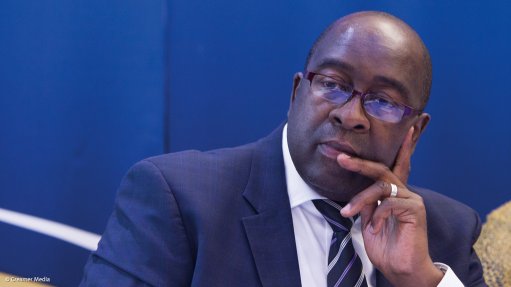
Finance Minister Nhlanhla Nene
Photo by: Duane Daws
Finance Minister Nhlanhla Nene clarified on Thursday that no process was under way to replace the entire Eskom board as suggested in media reports. Instead, Nene said that Public Enterprises Minister Lynne Brown was working on appointing a full 13-member board, in line with the State-owned power utility’s Memorandum of Incorporation.
Nene noted that Cabinet had endorsed only 11 board members in December during the “first round of board appointments” and that Brown had initiated a process of filling the two vacant positions. In addition, she would need to fill the vacancy left as a result of the resignation of former chairperson Zola Tsotsi. Following the resignation, Dr Ben Ngubane was appointed as interim chairperson from March 31.
Separately, Brown’s spokesperson Lionel Adendorf confirmed with Engineering News Online that the Minister would, in the coming weeks, consult with Cabinet on the appointment of a new permanent chairperson. She would “also look at the available skills within the board to determine who is most suitably qualified”.
Regarding Brown’s view on the current status of the board-led investigation into the state of the utility and the associated suspensions of the four executives, including CEO Tshediso Matona, Adendorf stressed that the board was best qualified to comment, as it had decided “independently” to institute the investigation.
“[The] Minister merely expressed her frustration with a variety of issues to the Eskom board. The board, independently, decided to look into the concerns raised through an investigation.”
On the respective roles of the Minister, the board, the war room and the inquiry, Adendorf stressed that Brown, as shareholder representative, was exercising oversight over the board in terms of the Memorandum of Incorporation and the Public Finance Management Act.
“The board manages the affairs of the utility and the war room provides an opportunity for all parties to . . . engage timeously on all issues to enable decision-making,” he explained.
Quoting from the board’s statement, Adendorf indicated that the inquiry would offer “an independent view on the status of, among other things, the poor performance of the generation plant, delays in bringing the new generation plant on-stream, high costs of primary energy and cash-flow challenges”.
Business Report reported, meanwhile, that Eskom would announce a new external consulting firm to drive the inquiry, following a board decision to terminate the appointment of Nick Linnell, owing to his appointment not having followed proper procurement procedures.
Regarding the weak financial position of the utility, which had indicated that it planned to approach the National Energy Regulator of South Africa (Nersa) for a partial reopener of the current tariff determination, Adendorf said Brown was “acutely aware” of Eskom’s financial-sustainability needs.
“But these needs have to be balanced against affordability for consumers and an enabling environment for economic growth. Eskom needs to make the application to Nersa, which would be able to answer this question.”